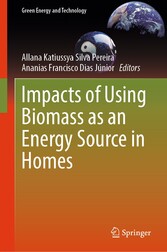Suchen und Finden

Impacts of Using Biomass as an Energy Source in Homes
The book deepens understanding of biomass sources and technologies used for cooking worldwide. It contributes directly to the creation of policies aimed at the mitigation of climate change.
Historically, wood is considered humanity's first source of energy. Even after decades of use and industrialization processes, it is still considered the most important single source of renewable energy. About a third of the world's population is energetically dependent on wood for cooking and/or heating. Recently, the Covid-19 pandemic made it impossible to purchase fuels such as liquefied petroleum gas (LPG), forcing families in financial difficulties to opt for cheaper and more accessible sources of energy, such as wood and vegetable coal. This has been the picture of many families around the world and negatively impacts the environment and energy security. Considering that there are still many wood residues that are wasted and that tropical forests need to be conserved, knowledge about the energy use of wood residues is also essential. This is even more relevant when considering the significant volume of biomass coming from the sustainable management of the largest tropical forest in the world, the Amazon Forest.
The book considers which wood variables should be taken into account when thinking about energy generation, how do food cooking technologies contribute to potentiating pollutants emissions, and how can these harmful effects be mitigated. It describes the chemical composition of biomass and the chemical compounds released during its burning, as well as their impacts on the environment and human health. It also presents the influence that technologies used in food cooking have on pollutant emissions and which alternatives can be used, such as the use of solar energy.
Allana Katiussya Silva Pereira
As Forest Engineer and Master in Forest Sciences, Allana Katiussya Silva Pereira has been working with forest product technology, mainly in the area of wood waste, biomass and energy and technological uses and applications of products generated from the pyrolysis of forest biomass. Currently, she is PhD Student at University of São Paulo and part of the Bioenergy and Forest-Based Bioproducts (BioEP) research group, developing research and extension projects aimed at valuing and reusing wood residues, knowledge and technology for application in biomass under the action of heat.
Ananias Francisco Dias Júnior
Ananias Francisco Dias Júnior currently works at the Forest Sciences and Wood Department, University of Espírito Santo, Brazil. He leads the research group Bioenergy and Forest-Based Bioproducts (BioEP), whose research and extension projects aim to develop knowledge and technology for the application and treatment of biomass under the action of heat, offering products and processes in an economically viable way and with attention to the social aspects. Together with your team, he develops innovative processes and products based on pyrolysis and heat, in order to value wood and charcoal as a source of energy, reduce gaseous emissions and atmospheric pollution in industrial and domestic areas, and mitigate the effects of climate change.
Alle Preise verstehen sich inklusive der gesetzlichen MwSt.










